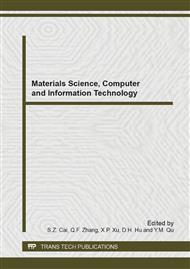[1]
Chunnian Liu, Yiyun Huang, Yubao Li, el at. Research on Construction and Application of Agricultural Risk Knowledge Based on Ontology. International Journal of Digital Content Technology and its Applications , vol. 6, no. 15, pp.338-346, (2012).
DOI: 10.4156/jdcta.vol6.issue15.38
Google Scholar
[2]
Li Jinhua, Jiao Yuying. Research on online information service model and algorithm Based on Intelligent Agent thematic . Intelligence theory and practice, vol. 6, pp.51-54, (2002).
Google Scholar
[3]
Preece A.D., Hui K.Y., Gray W.A., et al. The KRAFT Architecture for Knowledge Fusion and Transformation]. Knowledge Based Systems, vol. 13, no. 2, pp.113-120. (2000).
DOI: 10.1016/s0950-7051(00)00052-6
Google Scholar
[4]
Zou Xiang-jun. Virtual environment modeling and design of mechanical products based Knowledge Fusion. Guangdong University of Technology , (2005).
Google Scholar
[5]
Gou Jin. key technology of knowledge fusion research integration. Zhejiang University, 2005.
Google Scholar
[6]
Hu Bei, Wang Congying. High-tech industrial clusters and innovative model for developing coutries based knowledge fusion. Library and Information, vol. 2, pp.38-41 +73, (2009).
Google Scholar
[7]
Zhou Fang, Wang Pengbo, Han Liyan. Research on multi-source information integration algorithm . Journal of Beijing University of Aeronautics and Astronautics , vol. 01, pp.109-114, (2013).
Google Scholar
[8]
Cheng Quan. Community knowledge fusion mechanism research based on collaborative tagging . Intelligence theory and practice , vol. 8, pp.20-25, (2011).
Google Scholar
[9]
Ji Cheng, Zhu Xiaoming. Knowledge fusion based knowledge integration management of Enterprise mergers and acquisition. Research and development management , vol. 6, pp.78-84, (2007).
Google Scholar


